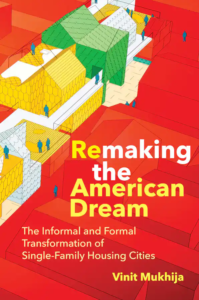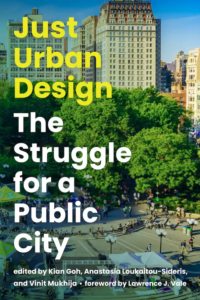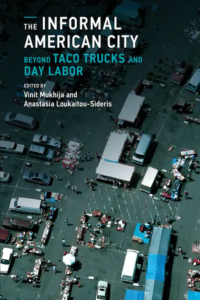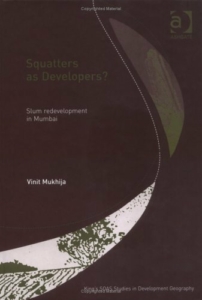Randall Crane studies the housing, transportation, and economic development challenges of cities, such as rushed urbanization, urban design/behavior linkages, urban environmental problems, public finances, housing and transportation demographics, and the measure, meaning and governance of sprawl. This work is international, with field experience in China, Colombia, Guyana, Indonesia, Kenya, the Philippines, Thailand, Vietnam, and Yemen, and a Fulbright professorship at the Colegio de México in Mexico City.
His areas of interest are Asia, climate change, community development, economic development, environment, gender issues, housing, international and comparative planning, labor and employment, Latin America, poverty, race and ethnicity, transportation, and urban redevelopment. His current research projects are: (1) the design of municipal taxes, fees, and prices; (2) person-versus place-based economic and community development; (3) Chinese urbanization; (4) the demographics of travel, 1985-2013; and (5) understanding smart growth.
Current Research Projects
The design of municipal taxes, fees and prices. Picking up where I left off in a series of papers in the 1990s on the determinants of the efficient and equitable mix of impact fees, property taxes, and other revenue instruments in theory and practice.
Person-versus place-based economic and community development (with Michael Manville). When are urban development strategies best addressed at geography, and when best aimed at individuals regardless of where they live and work?
Chinese urbanization. A substantial share of the world’s urbanization over the next few decades will be concentrated in China. I am particularly interested in the evolution of public/private governance of land development and the joint issues of suburbanization and CBD development/redevelopment, which come together in increasingly common greenfield CBD construction at the city edge.
The demographics of travel, 1985-present. How do race, age, sex and other social and economic circumstances (such as household formation) influence both the demand for and supply of travel by place, means and purpose? That is, what are the substantive linkages between labor and housing markets over space?
The demographics of US housing, 1985-2013. How have the specific patterns of housing use and conditions changed in US cities over the past two decades, across a broad spectrum of individual and community characteristics? Why?
Understanding smart growth (with Daniel Chatman). What is different, better and worse about so-called smart growth urban development strategies as efforts to address the problems of modern urbanization? This includes a current project for the state agency responsible for implementing California’s primary climate change legislation, focused on the lessons of various land use strategies (“Analyzing the economic benefits and costs of smart growth,” CARB, 2011-2014).
Chaired PhD Committees
Charisma Shonté Acey, PhD (2009) “Exit, voice, loyalty and structural silence: Citizen-consumer access and behavior in Nigeria’s urban water markets,” Professor UC Berkeley
Daniel Chatman, PhD (2005) “How the built environment influences non-work travel: Theoretical and empirical essays,” Professor UC Berkeley
Richard Crepeau, PhD (1995) “Mobility and the metropolis: Issues of travel and land use in urban America,” Professor Appalachian State University
Lynne Cripe, PhD (1997) “Predictors of community participation in sanitation facility improvement: Attitudes among female peri-urban residents of Quezon City,” Director The Konterra Group
Thomas H. Culhane, PhD (2010) “Getting into hot water: Problematizing hot water service demand, The case of old Cairo,” Professor University of South Florida
Priyam Das, PhD (2009) “Promise or compromise? Community managed water supply for the urban poor in Madhya Pradesh, India,” Professor University of Hawai’i at Mānoa
D. Gregg Doyle, PhD (2003) “‘Only a nobody walks’: The decline of pedestrian trips in the United States,” Consultant
Charles J. Gabbe, PhD (2016) “Do land use regulations matter? Why and how?” Professor Santa Clara University
Michael Heimert, PhD (1988) “Contractual alternatives for durable goods requiring maintenance,” Managing Director and Global Leader, Duff & Phelps, LLC
David Mason, PhD (2011) “Cooperation as collateral? : social capital and joint liability : microfinance group lending in Nicaragua,” The World Bank
Jan Mazurek, PhD (2008) “The politics of counting carbon: Lessons from the California Climate Action Registry,” Director, ClimateWorks Foundation
Gregory Pierce, PhD (2015) “Basic services, low-income settlements and the local state: How collectively-organized initiatives redress inequalities,” Senior Researcher & Adjunct Professor UCLA
Oscar Alberto Pombo López, PhD (1997) “Water, sanitation, and poverty in the Mexican borderlands: Considerations of water sanitation strategies used by the poor in Tijuana,” Professor El Colegió de la Frontera Norte, Mexico
Lisa Schweitzer, PhD (2004) “Environmental sacrifice zones: Risk and transport in Southern California,” Professor University of Southern California
Hyun-Gun Sung, PhD (2005) “Transit friendly Areas: The role of residential relocation and housing development in rail ridership over time,” Professor Chungbuk National University, Korea
Beth Tamayose, PhD (2011) “Rise of western land and water regulation on the Hawaiian Islands: An historical analysis of land, property, and water governance, 1840s-1910s,” Consultant
Recent and Upcoming Presentations
“Equity and Inclusiveness as Building Blocks for Local Government Planning,” invited, Asian Development Bank Conference, Seoul, Korea, December 2017
”On Planning Smart: Practice, Research and Education,” invited, 10th Year Celebration of the DUPM, Renmin University, Beijing, PRC, September 2017
”UN Sustainable Development Goal 11: Sustainable Cities & Communities,” invited, Sustainability Goals Series, UCLA Fielding School of Public Health, May 2017
“Lectures on Urbanization and Development,” invited, University of Sichuan, Chengdu, PRC, July 2015
“Private solutions to basic urban service gaps in Africa,” invited, World Resources Institute, Washington DC, May 2015″
Comparing urban problems and policies in the US and the PRC,” invited, University of Sichuan, Chengdu, PRC, July 2014
“Efficient Public Finance in Diverse Cities: Modelling the Choices Amongst Taxes in an Open Economy,” Applied Urban Modelling Conference: Planning Urban Infrastructure, Martin Centre for Architectural and Urban Studies, Cambridge University, April 2014
“New Developments in the Economic Modelling of Urban Design,” Applied Urban Modelling Conference: Productive, liveable and sustainable city regions, Centre for Research in the Arts, Social Sciences and Humanities, Cambridge University, June 2013
“Debating the Merits of Planning Research: The Importance of My Asking Questions You Think We Already Have Good Enough Answers To,” annual conference, Association of Collegiate Schools of Planning, Cincinnati, November 2012.
“The New Smart Growth: Practice, Education & Research,” Keynote speech, China Urban Planning Education Network Congress, Wuhan University, Wuhan, PRC, September 2012
“Public Private Partnerships in Urban Development: The Case of New Downtowns in China,” Keynote speech, Peking University/Lincoln Institute of Land Policy, Beijing, PRC July 2012
“Competitive Cities & Municipalities,” Mayors’ Forum, Philippine Local Government Academy, Manila, Philippines, January 2012
“The Effect of the New Normal on Local Government Finance,” Growth and Infrastructure Consortium Conference, San Diego, October 2011.
“Private/Public Strategies for the New Chinese Downtowns,” 3rd International Conference on Public Policy and Management, Tsinghua University, Beijing, October 2011.
“Water in Megacities: Solutions,” 2011 Global Economic Symposium, Kiel, Germany, October 2011.
“Commuting in Beijing,” International Association for China Planning Conference, Beijing, June 2011.
“Race, Gender and Sprawl: New Results,” Graduate School of Design, Harvard, April 2011.
“The Right to the Suburb?” Graduate School of Design, Harvard University, April 2011.
“Global Challenges and Emerging Opportunities Facing Today’s Cities,” Philippine Urban Consortium, Manila, March 2011.
“The Evolution of Public/Private Development: What Works, What Fails, and Why?,” University of Alberta, Edmonton, January 2011.
“Housing and the Built Environment: Shooting at Moving Targets,” Housing and Urbanization: What Housing Scholars Think about the Present and Future of the Field, Harvard Graduate School of Design, Cambridge, December 2010
“Trends in US Housing Consumption: 1985-2007,” annual conference, Association of Collegiate Schools of Planning, Minneapolis, October 2010.
“Downtown Inc. in the New China,” Megacities: Problematizing the Urban, conference of the New Encyclopedia Project, UC Irvine, June 2010.
“Cities and Global Sustainability,” Stumbling Toward Sustainability Lecture Series, Aquarium of the Pacific, Long Beach, May 2010
“Travel Behavior and the Scope for Smart Mobility Policies” Symposium on Smart Mobility, Florida State University, April 2010
“Pricing and Social Equity Challenges in Water,” Pricing and Social Equity: An Unplugged Conversation with the Experts, Keston Institute for Public Finance and Infrastructure Policy, USC, April 2010.
“Advanced Transportation Planning” workshop, 102nd National Planning Conference, APA, New Orleans, April 2010
“Getting, Doing and Debating Freakonomics,” Junior State of America, Pacifica High School, April 2010.
“Global Issues in Transportation Policy,” at The Rosenfield Forum, “Changing Lanes: Bold Ideas to Solve L.A.’s Traffic Problems,” Japanese American National Museum, Los Angeles, March 2010.
“Sources of the Narrowing and Widening of Travel Differences by Gender” TRB 4th International Conference on Women’s Issues in Transportation, Beckman Center, Irvine, October 2009
“Sex Changes Everything: The Recent Narrowing and Widening of Travel Differences by Gender” 50th Anniversary ACSP Conference, Washington, DC, October 2009
“New Downtowns in New China: Renewal, Replacement, or Relocation?” Urban Regeneration Roundtable, China Planning Network Conference, Renmin University, Beijing, June 2009
“Public Policy in Urban Planning,” Urban Planning and Public Policy Roundtable, China Planning Network Conference, Renmin University, Beijing, June 2009
“Does Gender Matter? Changes, Choices and Consequences for Transportation Policy,” Netconference 2009, National Center for Transit Research’s National TDM and Telework Clearinghouse at the University of South Florida, May 2009
“Sex Changes Everything: Trends in the Demographics of the U.S. Commute,” Visiting Scholars Seminar, University Transportation Research Center, The City College of New York, May 2009
“Place-Based versus People-Based Community Economic Development,” Lincoln Lecture Series, Lincoln Institute of Land Policy, Cambridge, Massachusetts, April 2009
“Land Planning for Local Public Finance in China,” Center for Urban Development and Land Policy, Peking University/Lincoln Institute, Beijing, April 2009
“Sex Changes Everything: Trends in the Demographics of the U.S. Commute,” National Center for Smart Growth, University of Maryland College Park, April 2009
“Gender Differences: Travel Trends and Research Issues,” Transportation Research Board Annual Meeting, Washington, DC, January 2009
“Reforming the Public Finance of Land in China,” for the symposium “China’s Three Decades of Urban Planning through an International Perspective,” Urban Planning Society of China, Xiamen, November 2008
Blog Reporter for Re-Imagining Cities: Urban Design After the Age of Oil, University of Pennsylvania, November 2008
“Does Gender Matter? Changes, Choices, and Consequences for Transportation Policy,” TRB Impact of Changing Demographics on the Transportation System Conference, Washington, DC, October 2008
“Urban Regeneration in the New China,” Financial Times Urban Regeneration Summit 2008, Shanghai, PRC, September 2008
“Economic Development and Transportation Access in China,” Chengdu Post-Earthquake Reconstruction Symposium, Chengdu, PRC, July 2008
“The New Fiscalization of Land Use in Chinese Cities,” CPN China Urban Housing Congress, Beijing, July 2008
“Urban Design and Transportation Policy,” Peking University—Lincoln Institute Center for Urban Development and Land Policy, Beijing, July 2008
Roundtables on “Place/People Development Planning” and “The Oxford Handbook of Urban Planning,” and paper on “U.S. Housing Trends, 1985-2005,” ACSP/AESOP Fourth Joint Conference, Chicago, July 2008
“Urban Growth with Chinese Characteristics,” Sino-US Workshop on the Environment and Sustainable Development in China, Natural Resources Defense Council and Global Environmental Institute, Party School of the Central Committee of the Communist Party of China, Beijing, PRC, May 2008
“Smart Growth with Chinese Characteristics,” Workshop on Sustainable Urban Planning for Medium and Small Chinese Cities, Center for Agenda 21 (Ministry of Science and Technology) and Natural Resources Defense Council, Tongling City, PRC, May 2008
“Comments on Revenues in Chinese Urban Public Finance,” Local Public Finance and Property Taxation in China, Lincoln Institute of Land Policy, Cambridge, Massachusetts, May 2008
“Mobility and Congestion,” 100th National Planning Conference, APA, Las Vegas, April 2008
“Sex and Travel in the USA, 1985-2005,” Annual Meeting of the Association of American Geographers, Boston, April 2008
“Smart Growth with Chinese Characteristics: Transportation/Land Use Integration in Urban China,” Harvard China Project, Harvard University, March 2008
“Sex, Race and Traffic: What is Changing and Why,” Distinguished Speaker Series, MIT Center for Transportation & Logistics, March 2008
“How Urban Form Affects Travel, Public Health, and Climate Change,” MIT Urban Studies & Planning, March 2008
“Public/Private People/Place Development Strategies,” Harvard Graduate School of Design, March 2008
“Challenges for Smart Growth in China (and the U.S.),” presentation to visiting delegation from the Chinese Academy of Urban Planning & Design, PRC, January 2008
“Sex and Traffic, Etc.,” Robert F. Wagner Graduate School of Public Service, NYU, December 2007
“Downtown Development in Los Angeles: Planning Obstacles & Opportunities,” Annual UCLA Real Estate Conference, Ziman Center for Real Estate, Skirball Center, Los Angeles, November 2007
“Sex and Commuting, 1985-2005,” Department of Policy, Planning & Design, UC Irvine, October 2007
“People-Based Versus Place-Based Economic Development Strategies: A Reconciliation,” ACSP Conference, Milwaukee, Wisconsin, October 2007. (with M. Manville)
“Challenges to Land Use/Transportation Integration in Modern Urban China,” Institute of Transportation Studies/Enjoyor, Zhejiang University, Hangzhou, PRC, October 2007
“Smart Growth with Chinese Characteristics,” Third International Symposium on Urban Development and Land Policy in China, Lincoln Institute of Land Policy, Hangzhou, PRC, October 2007
“Top 5 Challenges to Integrating Transportation with Land Use in Urban China,” 1st Urban Transportation Conference, China Planning Network, Beijing, August 2007.
“Urban Sprawl and the Built Environment,” Invited lecture, Beijing Municipal Institute of City Planning and Design, Beijing, August 2007.
“Suburbanization, Sprawl, and the New Mobility,” Seventh International Symposium on Asia Pacific Architecture, School of Architecture, University of Hawai’i at Mānoa, June 2007.
“Planeación Urbana y Políticas de Suelo: Puntos de Debate,” Seminario Internacional 10 Años de la Ley 388 de 1997: Sus Aportes al Ordinamiento Urbano y a la Consolidatión de Políticas de Suelo, National Capitol Building, Bogotá, Colombia, May 2007.
“Housing and Poverty in the U.S.: New Evidence on What, Who and Why,” Institute of Urban and Regional Development, UC Berkeley, April 2007.
“U.S. Housing Affordability and Crowding Trends, 1985-2005,” Annual Meeting of the Association of American Geographers, San Francisco, April 2007.
“Is the Gender Gap History?,” University of California Thirteenth Annual Transportation Research Conference, UCLA, February 2007.
“Sex, Lies, and Commuting in the US: 1985-2005,” University of Toronto, February 2007.
“New Research on the Journey to Work,” Department of Urban & Regional Planning, University of Illinois, Urbana-Champaign, January 2007.
“Sex, Lies, and the Built Environment,” Department of City & Regional Planning, University of Pennsylvania, Philadelphia, January 2007.
“Growth, Growth Impacts, and Planning for Growth,” Aquarium of the Pacific, Long Beach, December 2006.
“Integrating Land Use and Transportation Planning,” presentation to the Director of the Beijing Municipal Planning Bureau, November 2006.
“Public Economics for Planners,” ACSP Conference, Ft. Worth, Texas, November 2006.
“Local Public Finance Reform in China,” Second Annual International Symposium on Urban Planning and Land Policy, Lincoln Institute, Shenzhen, China, October 2006.
“Public Finance Concepts for Planners,” Fiscal Dimensions of Planning Seminar, Lincoln Institute of Land Policy, Cambridge, Massachusetts, July 24, 2006.
“Housing and Poverty in the USA, 1985-2005,” World Planning Schools Congress, Mexico City, July 14, 2006.
“The Rapid Development of China’s Urban Transportation Systems: Opportunities, Challenges and Policies,” China Planning Network 3rd Annual Conference, Beijing, June 14, 2006.
“Smart Growth in the U.S. and the Pearl River Delta Region,” World Planning Scholars Lecture 1, China Planning Network, Zhongshan University, Guangzhou, China, June 12, 2006.
“Lectures on Land Use,” Lincoln Institute of Land Policy and PRC Ministry of Land Resources, Qingdao, China, June 10-11, 2006.
“Public Finance and Urban Development Strategies in China,” invited, Symposium on Important Issues in the Era of Rapid Urbanization in China, Lincoln Institute of Land Policy, Cambridge, Massachusetts, May 22, 2006.
“Formal/Informal: A Perspective on China,” invited, Center for Architecture and People’s Architecture, New York City, May 16, 2006.
“Growth and Growth Impacts in the South San Francisco Bay Area,” invited, Social Science Dimensions Workshop: Identifying Political, Economic, and Social Obstacles and Opportunities, South Bay Salt Pond Restoration Project, Mountain View, California, April 18, 2006.
“Sex, Race and Roads: New Research on Shelter and Travel,” invited, Department of City Regional Planning, Cornell University, April 12, 2006.
“Suburbanization and Its Discontents: What We Do and Don’t Know About How to Plan the Built Environment,” invited, Department of Urban Planning, Columbia University, April 10, 2006.
“The American University of Cairo/UCLA Environmental Studies Initiative,” American University of Cairo, Egypt, April 3, 2006.
“Smart Growth with Chinese Characteristics,” invited, Changsha University of Science and Technology, Xiantang, and Chinese Academy of Urban Planning and Design, Beijing, China, December 2005.
“Four Lectures on Sprawl, Suburbanization, and Alternatives,” Lincoln Institute of Land Policy Workshop, Changsha, Hunan Province, China, December 2005.
“For a Few Dollars Less: Estimating and Regulating the Costs & Benefits of Wal-Mart,” invited, Economic Impact Research Conference: An In-Depth Look at Wal-Mart and Society, Washington DC, November 2005. (with D. Chatman)
“3 Questions for the American Housing Survey, 1985-2003,” invited, Ziman Center for Real Estate, UCLA, November 2005.
“Is the Gender Gap History? Commuting in America,” ACSP, Kansas City, October 2005.
“Emerging Planning Trends in Retail: The Case of Wal-Mart,” invited, Urban Growth Seminar, USC, September 2005. (with M. Manville)
“Housing Affordability, Regulatory Obstacles, and Smart Growth,” invited, Annual Real Estate Conference, Ziman Center for Real Estate, UCLA, September 2005.
“Traffic and Mobility: FAQ,” 2005 Corporate Partners Summit, Bren School of Environmental Science & Management, UC Santa Barbara, May 2005.
“Urban Development & Foreign Models in the New China,” ChinaPlan Conference, MIT, May 2005.
Selected Publications
People or Place?
Author: Crane, Randall and Michael Manville
Subtitle: Revisiting the Who Versus the Where of Urban Development
Description: One of the longest standing debates in community economic development is between “place-based” and “people-based” approaches to combating poverty, housing affordability, chronic unemployment, and community decline. Should help go to distressed places or distressed people?
Publication Link: PDF
Planning for accessibility
Description: “Planning for accessibility,” in G. Hack, E. Birch, P. Sedway and M. Silver, eds., Local Planning: Contemporary Principles and Practice, ICMA, 2009. (with L. Takahashi)
Publication Link: ICMA
Counterpoint: Accessibility and sprawl
Description: “Counterpoint: Accessibility and sprawl,” Journal of Transport and Land Use 1:1, Summer 2008.
Publication Link: Journal of Transport and Land Use
Other Publications
“Public Finance Concepts for Urban Planners,” in S. White and N. Kotval, eds. Financing Economic Development in the 21st Century, M.E. Sharpe, 2013.
The Oxford Handbook of Urban Planning, Oxford University Press, 2012 (Co-edited with Rachel Weber)
“Planning as Scholarship: Origins and Prospects,” in R. Weber and R. Crane, eds., The Oxford Handbook of Urban Planning, Oxford Univ. Press, 2012 (with R. Weber)
“Toward a Second Generation of Land-Use/Travel Studies: Theoretical and Empirical Frontiers,” in N. Brooks, K. Donaghy and G. Knaap, eds., The Oxford Handbook of Urban Economics and Planning, Oxford Univ. Press, 2012 (with Z. Guo)
“Planning for Climate Change: Assessing Progress and Challenges,” Journal of the American Planning Association 76, 2010, pp. 389-401(with J. Landis)
“Sex Changes Everything: The Recent Narrowing and Widening of Travel Differences by Gender,” Public Works Management & Policy 13, 2009, 328-337. (with L. Takahashi)
“Is there a quiet revolution in women’s travel? Revisiting the gender gap in commuting,” Journal of the American Planning Association 73, Summer, pp. 298-316, 2007.
“Public finance challenges for Chinese urban development,” in Y. Song and C. Ding, eds. Urbanization in China: Critical Issues in an Era of Rapid Growth. Cambridge: Lincoln Institute of Land Policy, 2007
“Emerging planning challenges in retail: The case of Wal-Mart,” Journal of the American Planning Association 71, Autumn 2005. (with M. Boarnet, D. Chatman and M. Manville).
“Central-local transfers in Kenya – Options for incremental reform,” International Development Planning Review 26 (1), February 2004.
Supercenters and the Transformation of the Bay Area Grocery Industry: Issues, Trends, and Impacts. San Francisco: Bay Area Economic Forum. (with M. Boarnet, D. Chatman and M. Manville), 2004.
“Transport in the urban core,” in D. Hensher, et al., eds. Handbook of Transport Geography and Spatial Systems. Elsevier, 2004. (with E. Blumenberg)
“Job sprawl and the journey to work in the USA,” in Chang-Hee Christine Bae and Harry W. Richardson, eds. Urban Sprawl in Western Europe and the United States. London: Ashgate, 2004. (with D. Chatman)
“Decentralizing Indonesia in 2004: Implications and recommendations for basic education,” RTI/USAID Report, November 2004.
“As jobs sprawl, whither the commute?” Access 23, 2003 (with D. Chatman)
“Traffic and sprawl: Evidence for U.S. commuting, 1985 to 1997,” Planning & Markets 6 (1), September 2003. (with D. Chatman)
“Transport and sustainability: The role of the built environment,” Built Environment 29 (3), 2003. (with L. Schweitzer)
Travel by Design: The Influence of Urban Form on Travel, Oxford University Press, 2001. (with M. Boarnet)
“The influence of land use on travel behavior: Estimation and specification issues,” Transportation Research A 35, 2001. (with M. Boarnet)
“The impacts of urban form on travel: An interpretive review,” Journal of Planning Literature 15, pp. 3-23, August 2000.
“A study to prepare urban development and management strategies for the City of Taiz, Yemen,” Ministry of Housing, Construction and Urban Planning, Government of Yemen and the World Bank, August 2000.
“A study to prepare urban development and management strategies for the City of Sana’a, Yemen,” Ministry of Housing, Construction and Urban Planning, Government of Yemen and the World Bank, August 2000.
“Public finance and transit-oriented planning: Evidence from Southern California,” Journal of Planning Education and Research 17, 1998. (with M. Boarnet)
“Who are the suburban homeless and what do they want? An empirical study of the demand for public services,” Journal of Planning Education and Research 18, 1998. (with L. Takahashi)
“Travel by Design?” Access 12, 1998.
“L.A. Story: A reality check for transit-based housing,” Journal of the American Planning Association 63, Spring 1997. (with M. Boarnet)
“The contributions of environmental amenities to low income housing: A comparative study of Bangkok and Jakarta,” Urban Studies 34, pp. 1495-1512, 1997. (with A. Daniere and S. Harwood)
“Does neighborhood design influence travel? A behavioral analysis of travel diary and GIS data,”Transportation Research D: Transport and Environment 3, pp. 225-238, 1998. (with R. Crepeau)
“Measuring access to basic services in global cities: Descriptive and behavioral approaches,” Journal of the American Planning Association 62, Spring 1996. (with A. Daniere)
“The influence of uncertain job location on urban form and the journey to work,” Journal of Urban Economics 39, 1996.
“Cars and drivers in the new suburbs: Linking access to travel in neotraditional planning,” Journal of the American Planning Association 62, Winter 1996.
“Efficient local charity with self selection,” Public Choice 86, 1996.
“On form versus function: Will the New Urbanism reduce traffic, or increase it?,” Journal of Planning Education and Research 15, 1996.
“The market value of environmental improvements in alternative fiscal regimes,” Journal of Regional Science 35, 1995.
Mexico City’s Water Supply: Improving the Outlook for Sustainability, A National Research Council Report of the Joint Academies Committee on the Mexico City Water Supply. Washington, D.C.: National Academy Press, 1995.
“Water markets, market reform, and the urban poor: Results from Jakarta, Indonesia,” World Development 22, 1994.




